Residential and office space is running short in Portland for a reason: the central city, not its more auto-oriented suburbs, has been leading the region’s charge out of the recession.
On one measure after another — job growth, median incomes for full-time workers, housing starts, working-age population growth — the City of Portland and Multnomah County have roared past Washington County over the last year as the site of most new economic activity in the metro area.
That’s the overarching finding of a statistical digest prepared by state workforce analyst Christian Kaylor and distributed Tuesday night.
This isn’t just a matter of Portland’s economy being the least bad in an underperforming region — just the opposite. Historically speaking, the local economy now seems to be doing genuinely well. In Kaylor’s previous two reports, he showed that the Portland region’s 3.1 percent job growth in the 12 months to July was the ninth fastest in the country and some of the fastest growth the region has seen since 2006.
But in a reversal from previous trends, Multnomah County has been leading that charge, both in creating jobs and in housing the workers who take them.
Kaylor drew on state employment figures as well as U.S. Census data released last month. The latter figure, he noted, offers “the rare opportunity to see how communities are doing based on where the workers actually live.”
A surprising tidbit: in 2013, for the first time in years, the Census-estimated median income for full-time workers living in the City of Portland exceeded that for Washington County residents.
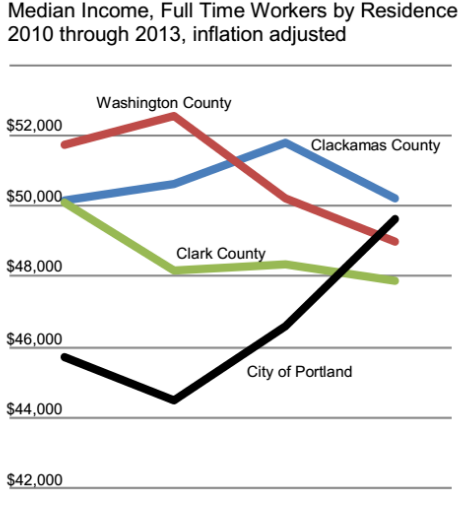
Washington and Clackamas counties, in fact, saw the estimated median income for their fully employed residents dip in 2013.
Advertisement
And in the 12 months to August 2014, separate state data showed, the number of new jobs created in Multnomah County has grown more than twice as fast as in its western and southern neighbors.
“Unusually, Multnomah County is showing some of the strongest growth in the region with 11,100 new jobs,” Kaylor wrote.
In the same period, Washington County added 2,600 net new jobs, Clackamas County 1,300.
As Kaylor’s previous report showed, one factor behind Multnomah County’s job growth is that its 2009 crash was much deeper than Washington or Clackamas County’s. But since early 2011, Multnomah has outpaced its neighbors’ job growth month after month after month:
That trend, in turn, is likely related to the fact that the City of Portland has been adding new residential units, almost entirely multifamily units, faster than almost any city in the region — though, as we reported last week, it’s still not been fast enough to keep up with the number of people who have been been moving here. So despite the new construction, Portland has seen the nation’s most persistent rental housing shortage and rapidly rising rents, especially in the central city.
What’s not clear from Kaylor’s report is how many of Portland’s economic gains are being shared among all Portlanders, and how much of the apparent boom is due to lower-income and unemployed Portlanders being priced out of a city that has failed to supply enough homes for them. East of Interstate 205, Kaylor’s Census analysis showed, median incomes are 27 percent below the citywide $46,616. Only 20 percent of East Portlanders have a college degree, compared to 46 percent citywide.
Another question: why is Portland’s economy creating so many jobs while suburban areas lag? That’s hard to say, of course, and there’s no guarantee that it’ll continue. One possibility is that housing construction, a big driver of job growth, moves more slowly in the suburban context, and that Washington County will catch up.
As we reported in March, Multnomah County alone has created more new “professional and technical services” jobs in the last three years than the Columbia River Crossing freeway project had been expected to create in all categories for the whole metro area combined by 2030.
But one thing does seem certain: At least until Washington County changes its ways on road design, every job that lands in central Portland instead of a suburb is one that’s far more likely to be reached on a bicycle.
Interested in the future of Portland’s economy? Kaylor and two other economists will share their outlook at a $25-a-plate breakfast Oct. 24. You can also sign up for Kaylor’s monthly economic memos, always a quick and useful read, by emailing him: Christian.R.Kaylor@oregon.gov.
— The Real Estate Beat is a regular column. You can sign up to get an email of Real Estate Beat posts (and nothing else) here, or read past installments here. This sponsorship has opened up and we’re looking for our next partner. If interested, please call Jonathan at (503) 706-8804.



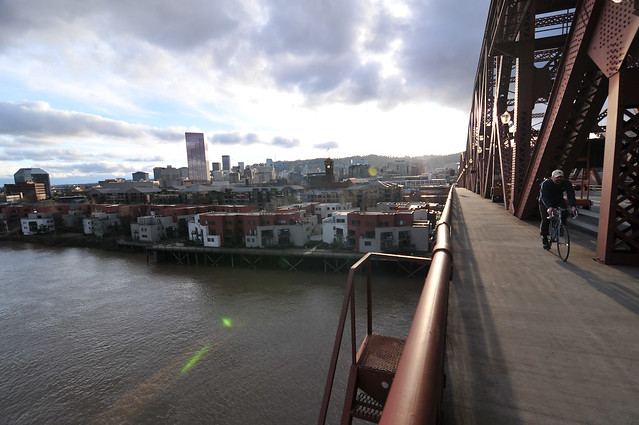



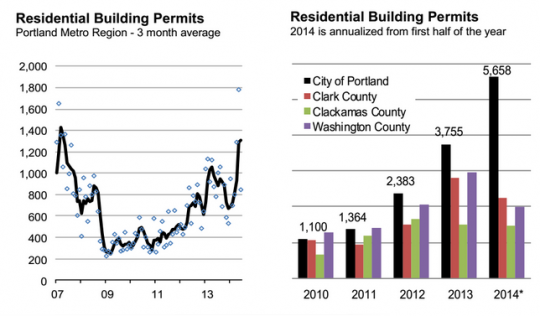
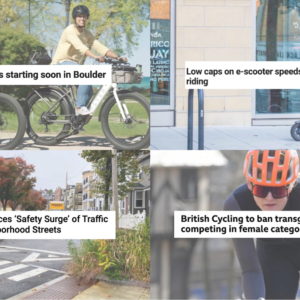
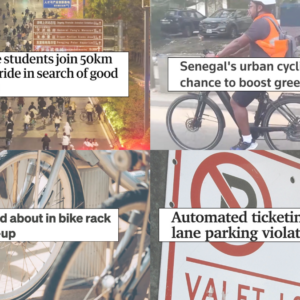

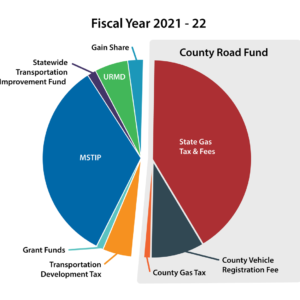
Thanks for reading.
BikePortland has served this community with independent community journalism since 2005. We rely on subscriptions from readers like you to survive. Your financial support is vital in keeping this valuable resource alive and well.
Please subscribe today to strengthen and expand our work.
One of the huge benefits of the downtown life, bicycling and related culture is the tech sector – which is continuing to bring hundreds of jobs downtown with a huge percentage of those taking the jobs wanting to bike into work, take transit, live in walkable neighborhoods and other such amenities. All things that the surrounding counties (and even too many places in Multnomah) simply do not offer. These jobs tend to be the real median income future of America’s hope to maintain a middle class.
Based on just that single metric, I’d expect to see downtown Portland sustain that growth for a while. When companies come to me to determine employment needs and discuss locating, I rarely can make a suggestion to move anywhere but to the city or the inner east side of Portland (west of 39th).
I would also expect to see this trend continue as the health care industry continues to train and bulk up in the city center. I’d love to get some reports on what other occupations and such are behind this spike in income growth and such.
Re: building permits
How is the calculated. If a developer wants to build a development with 50 homes, does he actually get 50 individual building permits? Or would it just be one?
If it is the latter, I wonder if that might be skewing the data comparing Portland the ‘burbs, as there is more space for bigger projects on the outskirts?
I’m assuming the data comes from the census, and they count each new unit authorized. So a development of 50 homes would show up as 50, or an apartment complex with 50 units would show up as 50.
There’s no universal answer to that question. However census permit data records both number of buildings and number of units. I have to assume the charts above are showing units.
One building (regardless of size) is one building permit. However, the chart may be referring to number of dwelling units…
Each home gets counted as a single permit.
Logistically, a developer needs multiple permits per house. Zoning, electrical, structural, plumbing, etc. I’m just counting how many homes and apartments the government is permitting as a way to count new housing development.
Christian
Single family permits are one permit for each unit. Multi-family may have one or more permits for as many as 400 or more units but the number of units are listed on the permit. Mixed use developments may also be shown as a non-residential permit but the number of residential units are also listed. Many years ago this was sometimes a problem for very inexperienced data reporters. However, it has been corrected for years. You are looking at data for dwelling units permitted (not necessarily built but it is usually close). All sources of bias mentioned above actually would work to underestimate City of Portland building permits counts; not the other way around. Why the Portland Central City and a number of other west coast central cities are disproportionately prosperous is a discussion, that I shall leave to others but I do find it entertaining.
I have friends making $10/hr and living in Portland. Both spouses work, spare rooms are rented out, it is tough.
If you look at a longer term chart of residential permits – going back to pre-recession – you’ll see there is a whole lot of catch-up still needed. The tight housing market developed over several years and it isn’t going to be “fixed” very soon.
No wonder there is so much anger coming from Clackamas County. Look how economically depressed they are compared to the rest of the area. I can only attribute that to failed government policies.
And yet they allowed us in Multnomah county to get soaked for the Sellwood bridge.
Is there a reason the chart of residential building permits is just cities and doesn’t include unincorporated Washington County?
Great question. I don’t know.
I was trying to keep it simple. Washington County is physically quite large and unincorporated is a vast nebulous geography.
Still, as you can see on the bottom chart on the right, Washington County (incorporated and non) is a fraction of the City of Portland and declining.
There goes the neighborhood…
I must be crazy but the best riding in this area is in Washington County. Riding in Portland is about nessesity and transportation but who rides in Portland for fun? People either go east or west.